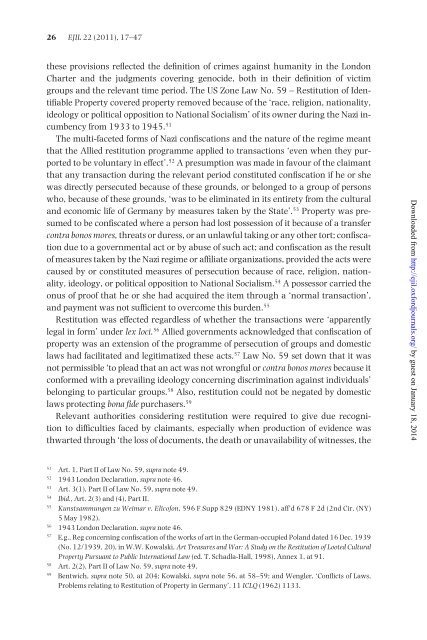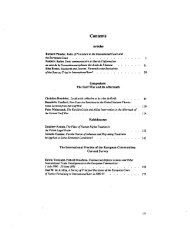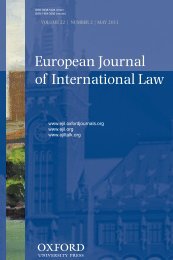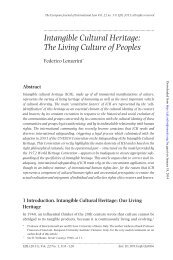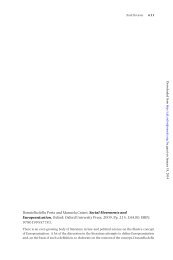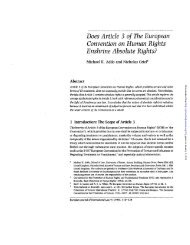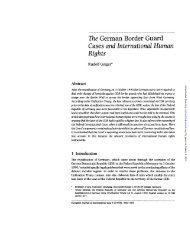Genocide and Restitution - European Journal of International Law
Genocide and Restitution - European Journal of International Law
Genocide and Restitution - European Journal of International Law
Create successful ePaper yourself
Turn your PDF publications into a flip-book with our unique Google optimized e-Paper software.
26 EJIL 22 (2011), 17–47<br />
these provisions reflected the definition <strong>of</strong> crimes against humanity in the London<br />
Charter <strong>and</strong> the judgments covering genocide, both in their definition <strong>of</strong> victim<br />
groups <strong>and</strong> the relevant time period. The US Zone <strong>Law</strong> No. 59 – <strong>Restitution</strong> <strong>of</strong> Identifiable<br />
Property covered property removed because <strong>of</strong> the ‘race, religion, nationality,<br />
ideology or political opposition to National Socialism’ <strong>of</strong> its owner during the Nazi incumbency<br />
from 1933 to 1945. 51<br />
The multi-faceted forms <strong>of</strong> Nazi confiscations <strong>and</strong> the nature <strong>of</strong> the regime meant<br />
that the Allied restitution programme applied to transactions ‘even when they purported<br />
to be voluntary in effect’. 52 A presumption was made in favour <strong>of</strong> the claimant<br />
that any transaction during the relevant period constituted confiscation if he or she<br />
was directly persecuted because <strong>of</strong> these grounds, or belonged to a group <strong>of</strong> persons<br />
who, because <strong>of</strong> these grounds, ‘was to be eliminated in its entirety from the cultural<br />
<strong>and</strong> economic life <strong>of</strong> Germany by measures taken by the State’. 53 Property was presumed<br />
to be confiscated where a person had lost possession <strong>of</strong> it because <strong>of</strong> a transfer<br />
contra bonos mores, threats or duress, or an unlawful taking or any other tort; confiscation<br />
due to a governmental act or by abuse <strong>of</strong> such act; <strong>and</strong> confiscation as the result<br />
<strong>of</strong> measures taken by the Nazi regime or affiliate organizations, provided the acts were<br />
caused by or constituted measures <strong>of</strong> persecution because <strong>of</strong> race, religion, nationality,<br />
ideology, or political opposition to National Socialism. 54 A possessor carried the<br />
onus <strong>of</strong> pro<strong>of</strong> that he or she had acquired the item through a ‘normal transaction’,<br />
<strong>and</strong> payment was not sufficient to overcome this burden. 55<br />
<strong>Restitution</strong> was effected regardless <strong>of</strong> whether the transactions were ‘apparently<br />
legal in form’ under lex loci. 56 Allied governments acknowledged that confiscation <strong>of</strong><br />
property was an extension <strong>of</strong> the programme <strong>of</strong> persecution <strong>of</strong> groups <strong>and</strong> domestic<br />
laws had facilitated <strong>and</strong> legitimatized these acts. 57 <strong>Law</strong> No. 59 set down that it was<br />
not permissible ‘to plead that an act was not wrongful or contra bonos mores because it<br />
conformed with a prevailing ideology concerning discrimination against individuals’<br />
belonging to particular groups. 58 Also, restitution could not be negated by domestic<br />
laws protecting bona fide purchasers. 59<br />
Relevant authorities considering restitution were required to give due recognition<br />
to difficulties faced by claimants, especially when production <strong>of</strong> evidence was<br />
thwarted through ‘the loss <strong>of</strong> documents, the death or unavailability <strong>of</strong> witnesses, the<br />
Downloaded from http://ejil.oxfordjournals.org/ by guest on January 18, 2014<br />
51<br />
Art. 1, Part II <strong>of</strong> <strong>Law</strong> No. 59, supra note 49.<br />
52<br />
1943 London Declaration, supra note 46.<br />
53<br />
Art. 3(1), Part II <strong>of</strong> <strong>Law</strong> No. 59, supra note 49.<br />
54<br />
Ibid., Art. 2(3) <strong>and</strong> (4), Part II.<br />
55<br />
Kunstsammungen zu Weimar v. Elic<strong>of</strong>on, 596 F Supp 829 (EDNY 1981), aff’d 678 F 2d (2nd Cir. (NY)<br />
5 May 1982).<br />
56<br />
1943 London Declaration, supra note 46.<br />
57<br />
E.g., Reg concerning confiscation <strong>of</strong> the works <strong>of</strong> art in the German-occupied Pol<strong>and</strong> dated 16 Dec. 1939<br />
(No. 12/1939, 20), in W.W. Kowalski, Art Treasures <strong>and</strong> War: A Study on the <strong>Restitution</strong> <strong>of</strong> Looted Cultural<br />
Property Pursuant to Public <strong>International</strong> <strong>Law</strong> (ed. T. Schadla-Hall, 1998), Annex 1, at 91.<br />
58<br />
Art. 2(2), Part II <strong>of</strong> <strong>Law</strong> No. 59, supra note 49.<br />
59<br />
Bentwich, supra note 50, at 204; Kowalski, supra note 56, at 58–59; <strong>and</strong> Wengler, ‘Conflicts <strong>of</strong> <strong>Law</strong>s,<br />
Problems relating to <strong>Restitution</strong> <strong>of</strong> Property in Germany’, 11 ICLQ (1962) 1133.


